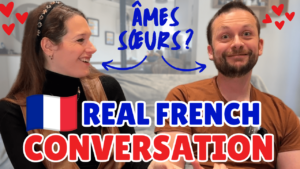In this video, I'll introduce you to the French expressions/abbreviations we use every day. Whether you're writing text messages or messages on Whatsapp or social networks, the French use these expressions a lot
List of 25 abbreviations to know in French
0:00 - Introduction
1:40 - MDR, laughing out loud
2:25 - TKT, don't worry
2:51 - Please, please, please
3:28 - JPP, I can't take it anymore
3:55 - ASKIP, by the looks of it
4:22 - CHUIS, I am
2:25 - TKT, T'inquiète
2:51 - Please, please, please
3:28 - JPP, I can't take it anymore
3:55 - ASKIP, by the looks of it
4:44 - ISPM, anything goes
5:15 - OKLM, quiet
5:38 - TMTC, you know yourself
6:09 - BJR, BSR, SLT, CC, hello, good evening, hi, cuckoo
6:42 - DSL, sorry
7:00 - JTM, I love you
7:15 - PCO, much
7:34 - BG, handsome or beautiful
7:57 - TOF, photo
8:12 - KDO, gift
8:37 - MTN, now
8:58 - TJR, always
8:18 - PK, PQ, why
9:39 - PB, problem
10:08 - a+, see you later
10:27 - Like or subscribe 🙂
Transcript
Hello everyone. I hope you're doing well and that your French language learning is going well. So today we're going to talk about SMS language in French.
In every language, in every country, people use SMS. It's used when we send messages, or when we go online to talk in writing. The French are no exception to the rule. These are French codes and expressions that can be very complicated to understand for someone learning French. For example, some words are written phonetically, i.e. the way you hear them. So we write them the way we hear them.
This means that the words will contain spelling mistakes. It's hard enough to learn French by spelling it right, but now you're going to have to understand it with spelling mistakes. Other words are simply going to be abbreviated, so we're going to use abbreviations. And then - and this is another level up - there are words that combine phonetics, so they're written as you hear them, but they're also abbreviated, shortened.
So that's going to be even more complicated to understand. So today, we're going to take a look at the 25 most common SMS expressions used in French. The first expression we're going to look at is MDR. MDR is short for "mort de rire" ("death of laughter"). So it's the English equivalent of lol. Or haha, or the Spanish jaja. In short, you want to show that you're laughing. When someone sends you a funny message or tells you something that makes you laugh, you can show the person that you're laughing by sending "mdr".
So, for example, if someone sends you a text message saying "I made a recipe and got the salt and sugar mixed up, it was really bad", you can reply with "mdr" to say that you're having a laugh, that you're making fun of this person.
The second expression is "tkt". So tkt means worry, so don't worry, there's nothing to worry about. So, for example, if someone sends you a message saying "Can you come and water my plants while I'm on vacation?
you can answer "tkt, I'll take care of it" to say don't worry, don't worry, I'll take care of it.
So the next expression is "please" and "svp". Stp is the polite version and svp is the polite version. So it simply means "please" or "s'il vous plaît". For example, if you're waiting for someone, you could say "Please let me know ten minutes before you arrive", or if you're trying to arrange a meeting with someone, for example, in a more professional setting, you could say "Please send me the date that suits you" to say "please".
So the next SMS expression is "jpp". So jpp stands for "j'en peux plus". So when you say "jpp, j'en peux plus", it means you've had enough, you're at the end of your rope. So, for example, you could send a message to someone to say that you're going to be late by saying "The bus didn't come, jpp, I'm going to be late", to say that you're drunk, that you're fed up.
So the next abbreviation is askip. askip, a s k i p, is short for "à ce qu'il paraît" so "à ce qu'il paraît" means apparently, I've heard. So, for example, you could send an sms: "askip we don't have class this afternoon" to say, apparently, our teacher is absent.
So the next word is "chuis" written, c h u i s. So, in fact, it's a very, very bad way, with a very, very bad spelling of "I am".
For example, you could send a message to someone: "chuis là" to say that you're at the bottom of their building.
The next abbreviation is "nimp" n i m p. It's an abbreviation for "anything", so it's anything. So, we use it to say it doesn't make sense, it's not coherent. So, for example, if a friend sends you a message saying "I've had too much, I ate four croissants this morning", you might reply "it's nimp mdr".
To say at once, it's nonsense and at the same time, it makes you laugh a lot, she's exaggerating.
The next expression is "oklm". So it's simply "au calme". So we use this expression to say that you were relaxed. So, for example, you could send a message to say "I've been reading books all afternoon oklm" to say you were relaxing.
The next abbreviation is tmtc. So tmtc stands for "you yourself know".
You want to tell someone that you understand each other. You don't need to say anything more, that you know what we're talking about. So, for example, if you've missed coloring your hair, you could send it to a friend who also often misses it, you could say "my hair doesn't look like anything, tmtc" to say that she, too, knows what we're talking about, she's familiar with this kind of situation.
So now we're going to see four for the price of one.
So these are different shortcuts for greeting someone by message. So hello, let's say bjr. Good evening, we'll use bsr. Coucou, we'll just put cc. And finally, salut, we'll use slt. For example, you can send a message "slt, tu vas bien?" to say "salut, comment ça va?"
The next one is "dsl". So really it's "sorry" where you only use consonants.
For example, you can send a text message to someone saying "dsl, I'll be late" to say that you won't be on time for an appointment and that you're sorry.
The next expression is jtm. Jtm is the abbreviation for "I love you". It's not the shortest, classiest abbreviation to use in SMS, so if you can spell it out, that's preferable. The next abbreviation is bcp, so it's short for "a lot". So it's a simple and effective shortcut, so in a sentence, you can say "il y a bcp de monde à la poste je serai en retard" by putting "bcp" to write faster.
So the next abbreviation is "bg". BG isn't just used in text messages, it's also used orally. It's an abbreviation of "beau gosse", meaning that someone is handsome, a pretty boy. So, for example, you could say "I met a guy yesterday, he's really bg" to say that you've met a boy who's very handsome.
The next word is "tof". A tof is simply a photo. So, for example, you could send a friend "send me tofs of your new dog" to say you'd like to see photos of her dog.
So the next shortcut is "kdo". So "kdo" simply means gift. A gift is something you receive or are given. So, for example, you might receive a text message like "Bon anniv, tu avez eu des beaux kdo?" (Happy birthday, did you get any nice kdo?), so it's someone asking you if you've received any nice gifts, if you've been spoiled for your birthday.
The next shortcut is "mtn", so it's also a pretty effective shortcut, just to say "now". So you put "mtn" in your sentence instead of "now", which is quite a long word. For example, you could text "see you mtn" to say "see you now".
The next word is "tjr" for "always".
So you simply put it in your sentence and, again, it's a long word that you shorten to save time. So, for example, you could write "there are always people in this pizzeria" all the time.
The next abbreviation, "pk" or "pq", stands for "why? It's an interrogative word used to ask a question. For example, you can write to someone "pk tu répond pas?" and to make it shorter you put "pq" or "pk". Then the next shortcut is "pb".
"Pb" This is the shortened way of saying "problem". So, to say in general, "no problem", so no worries, don't bother. So, for example, if someone says to you "will you be able to help me with my French homework", you can answer "pas de pb" to say "no problem, I'll help you, don't worry". Finally, the last word we're going to look at today, the last expression, is "a+" which is spelled "a" and the "+" of an addition.
So it means "see you later", "see you soon". We use the A and the + to say goodbye to someone. Now it's my turn to say "a+", I hope you enjoyed this video. If you did, don't hesitate to like it and subscribe to the channel. You can also visit www.hellofrench.com to discover other expressions. See you soon. A+ !








